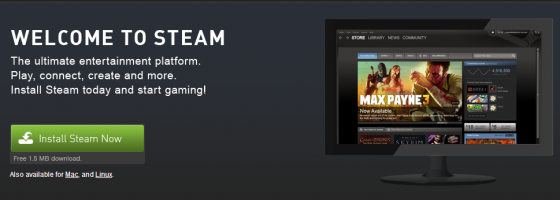Over the last few weeks and maybe even the last few years, people have been lamenting the rise of digital distribution and online sales of video games. Looking at the industry it’s easy to see why : Xbox One’s original feature of required internet connection, developers and publishers attacking used game sales and constant micro transactions to name a few.
But with all the doom and gloom it can be easy to forget some of the major benefits that have come from the game industry going digital.
Pre-loads instead of Pre-orders:
While Game-Stop and publishers and will have you believe that pre orders are still a big deal, in my opinion the act of pre-loading and instant access to titles was a major milestone in the game industry.
This is one of those times that I get to sound really old. During the 90s and early 00s, video games were tied to retail stores in terms of availability. The release of a game didn’t matter if the store nearest you didn’t get any of them in for whatever reason.
And yes, you can imagine the craziness of trying to find whatever game that just came out during the holiday season. I remember trying to find a copy of Starcraft: Brood War during the holidays one year and the mad house that was my local mall.
For the older gamers reading this, raise your hand if a video game store employee ever uttered the dreaded phrase: “you should have pre-ordered” when trying to buy the latest game on release day.
Another part of the pre-order madness was the concept of the midnight launch, where gamers would wait inside (or outside) game stores for the release of a new game. We’ve seen this with GTA, Halo, Call of Duty and many other big name releases. And yes, I was one of the many people who waited until 1 AM on 9/9/99 for a Sega Dreamcast.
As digital stores became more popular in the 00s, both from digital platforms like Steam and retailers like Amazon, the need of a physical game store has declined.
With sites like Amazon, I don’t need to rush around to game stores or wait in long lines to preorder or buy a game I want. Instead, a few clicks of the mouse and I can have the game I want delivered to my door on launch day, or a few days after.
With digital platforms like Steam came the lovely concept of a preload for PC gamers. Due to the size of PC games growing as new technology and better graphics were introduced, so did the amount of time needed to download and install these games grew.
Steam introduced the concept of preloading a game: Where anyone who had pre-purchased a big name title could download all the necessary files for installing the game anywhere from a few days to a week before release.
That way on launch day, all the player needed to do was download the remaining verification files and they were good to go.
I remember playing both Left 4 Dead and Portal 2 the very night of launch on Steam with little problem. And the ease of having everything ready to go on launch day is better in my opinion as opposed to waiting in line all night.
The other advantage of digital content has to do with availability, much to the dismay of game collectors.
Video Game Hunts:
When video games were limited to physical copies, this meant that there was an actual limit to the # of games in an area, and when those copies were gone it could become a scavenger hunt to try and find them.
Now, with major companies like Nintendo, EA and so on, they had the money and resources to print a lot of copies of their big hits. But when we move down to AA developers like Atlus, From Software and others who didn’t have those funds, finding one of their games became a lot harder.
The lack of copies was actually a business strategy by Atlus to minimize risk of selling a poorly received game. If you are estimating that your game will sell around 200 k copies, it doesn’t make sense to spend the money to produce 500 k copies and hope for the best. And when you’re selling a niche series like Shin Megami Tensei, having that risk buffer was a smart move.
However on the flip side, if your game did become a hit then you may run the chance of demand beating out supply and have gamers wanting to buy your game, but no copies to sell. There was a running joke with Atlus that if you wanted their newest game, you had better pre-order it or you may not find it again.
And that was true for several of the Shin Megami Tensei games and the first three Etrian Odyssey titles. Since then, Atlus has become better at providing copies of their games as well as issuing reprints , such as reprinting Nocturne twice due to demand.
Thanks to digital, it has become incredibly easy to find games that you are interested in, as there is no such thing as a set # of digital copies in the world.
If there is a game on Steam or GOG that I’m interested in, I will never have to worry about them running out of anything.
Recently, Nintendo had an issue with not estimating the demand for their new Fire Emblem game on the 3DS, and the game was out of stock for most of the country.
However, the game was made available on the 3Ds store on launch date and while not a perfect fix, still gave consumers an option to buy it.
Another great aspect about digital distribution is accessibility, both with old and new games. With older titles there is the issue with both finding the actual game and getting it to run when it comes to PC games.
I, like many strategy gamers had to go on a small quest to find copies of Sid Meier’s Alpha Centuri’s expansion in the last decade, with the only supply from people wanting outrageous prices for their copies.
But with GOG I can now buy both the original and the expansion for only a few bucks. Not only that, but it is a lot easier to play a classic game from GOG than trying to get something from 1988 to work for the general consumer.
While gamers may still have to jump through hoops to play their games with online platforms serving as DRM, it is still better than the old days with companies installing software to your computer without you knowing, such as the dreaded StarForce that rumored to cause more problems than it fixed.
Another major component of accessibility was the rise of the indie market, which could not have been possible in the old days. With retail stores, the developer/publisher had to pay for shelf space which for smaller companies priced them right out of the hands of consumers. But today, many indie developers can self publish, or get on a service like Steam for a lot less.
And crowd-funding, which has led to the success of kickstarter has become another option for indie developers to work on the titles they love and couldn’t be possible without digital money transfers and banking.
Lastly, with the increase presence of digital distributors has ushered a change in the pricing and sales structure of the industry which major publishers and developers weren’t too happy about.
First with Steam and now with other stores, game sales have become a major element of being a gamer. In most cases it doesn’t make sense to spend full retail price on a game anymore. All the more so with the GOG Summer sale going on and the Steam Summer sale starting any day now.
With the lower cost comes the opportunity for gamers to experience more games than they would have ever had if they could only buy games at full price.
The rise of the Internet and the digital age , has been one of the biggest fundamental shifts in society and over the last decade, has had an irreversible affect on the game industry. While there has been a lot of good to come from the digital age, there have been some downsides which I’ll be coming back to soon.




